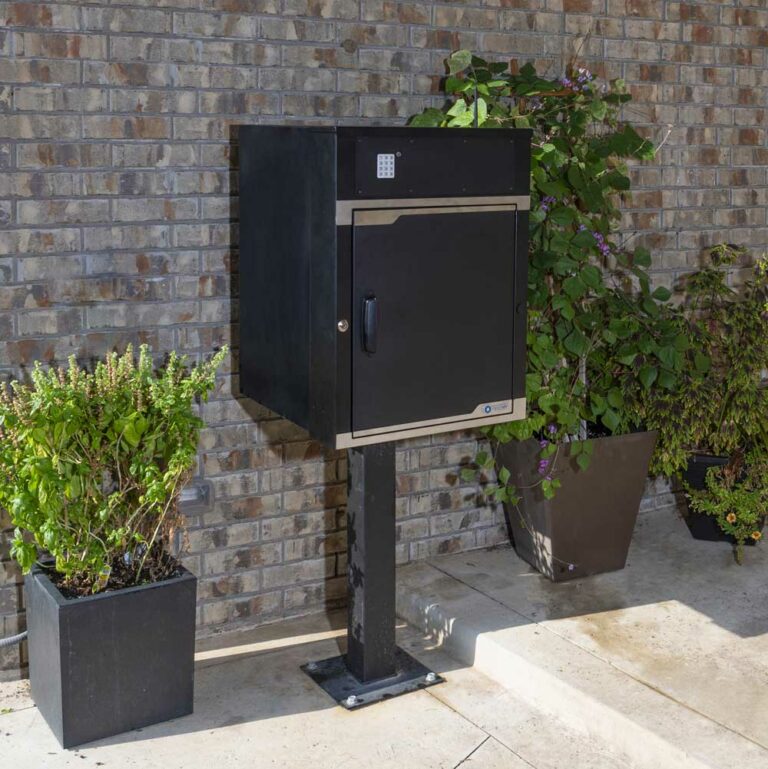Imagine coming home to find that expensive laptop you ordered for work has vanished from your doorstep. Or discovering that critical business supplies never made it past your office entrance. You’re not alone—package theft has exploded into a multi-billion dollar crisis affecting both homeowners and businesses across America.
The Shocking Reality of Package Theft in America
The numbers are staggering: nearly 260 million packages were stolen in 2024, representing a 10-fold increase since 2017. With over 60 billion packages delivered annually and e-commerce growth showing no signs of slowing, this isn’t just a minor inconvenience—it’s a fundamental security challenge reshaping how we think about deliveries.
According to the National Retail Federation, the average value of stolen packages ranges from $50-$100 for residential deliveries, but business-related thefts often involve much higher-value items including electronics, medical supplies, and confidential documents.
Why Package Theft Hurts More Than Your Wallet
For Homeowners: Beyond Financial Loss
Personal Impact:
- Loss of essential medications or baby supplies
- Stolen gifts affecting special occasions
- Identity theft risk from intercepted personal documents
- Decreased sense of security in your own neighborhood
- Time lost dealing with retailers and insurance claims
Hidden Costs:
- Replacement shipping fees
- Emergency purchases at higher retail prices
- Increased home insurance premiums
- Security system upgrades
For Businesses: Operational Disruption
Direct Business Impact:
- Project delays from missing critical components
- Employee productivity loss managing package issues
- Replacement costs for stolen equipment
- Liability concerns for confidential deliveries
Compliance and Security Risks:
- HIPAA violations from stolen medical deliveries
- Data breaches from intercepted documents
- Supply chain disruption
- Vendor relationship strain
Research from Security Magazine indicates that businesses lose an average of $1,200 annually to package theft, not including indirect costs like employee time and project delays.
Why Traditional Security Solutions Fall Short
The Camera Paradox
Most people’s first instinct is installing security cameras, but cameras present a fundamental limitation: they’re reactive, not preventive. While footage might help identify thieves after the fact, it rarely leads to recovery of stolen items or prevents future thefts.
Camera Limitations:
- Provide evidence after theft occurs
- Don’t physically protect packages
- Often fail to capture usable identifying details
- Create privacy concerns for neighbors and delivery personnel
The “Safe Spot” Myth
Many attempt to solve package theft by instructing delivery personnel to hide packages or leave them with neighbors. However, these strategies often backfire:
- Hidden packages are easily discovered by persistent thieves
- Neighbor dependency creates social obligations and scheduling conflicts
- Business reception areas can become overwhelmed during peak delivery periods
- “Secure” locations like garages may not be accessible to all carriers
The Evolution of Package Theft: Why Thieves Are Getting Smarter
Organized Crime Networks
Package theft has evolved beyond opportunistic individuals to include organized operations that:
- Follow delivery trucks through neighborhoods
- Use technology to track delivery schedules
- Target high-value packages based on return addresses
- Operate across multiple jurisdictions to avoid detection
Business-Specific Targeting
Commercial package theft often involves:
- Industrial espionage through intercepted prototypes
- Medical supply theft for black market resale
- Technology equipment targeting for rapid resale value
- Document theft for identity and financial fraud
The Real Cost of Inadequate Package Theft Prevention
For Families and Homeowners
The Federal Trade Commission reports that package theft affects household budgets in ways beyond the immediate loss:
- Emergency replacement purchases at premium prices
- Subscription service disruptions affecting essential items
- Gift-giving stress during holiday seasons
- Medication delays creating health risks
For Businesses and Organizations
Package theft creates cascading operational challenges:
- Project timeline disruptions affecting client deliveries
- Inventory management complications requiring buffer stock
- Employee morale issues when personal packages are targeted
- Security audit findings requiring costly remediation
Modern Package Lockbox Solutions: Beyond Basic Storage
What Makes Today’s Solutions Different
The latest generation of smart package box technology addresses traditional security gaps through:
Intelligent Access Control:
- Temporary access codes for different carriers
- Real-time notifications when packages arrive
- Remote monitoring capabilities for multiple locations
- Integration with existing security systems
Physical Security Enhancements:
- Weather-resistant construction for year-round reliability
- Tamper-evident features that deter break-in attempts
- Size flexibility to accommodate various package dimensions
- Professional installation options for optimal placement
Business-Grade Features for Commercial Applications
Modern package lockbox systems designed for business use include:
- Multi-user access management for different departments
- Audit trails documenting all access attempts
- Scalable installations for growing delivery volumes
- Integration capabilities with existing facility management systems
Emerging Trends in Delivery Security
Amazon Package Protection and Carrier Partnerships
Major shipping companies are beginning to recognize the package security challenge:
- Amazon Hub Lockers in select commercial locations
- UPS My Choice delivery scheduling options
- FedEx Delivery Manager location control features
- USPS Informed Delivery preview services
However, these solutions often have limitations:
- Limited availability in suburban and rural areas
- Inconvenient pickup locations requiring additional trips
- Reduced delivery flexibility
- No protection for multi-carrier deliveries
Technology Integration Trends
The future of package security increasingly involves:
- Smart home ecosystem integration for seamless operation
- AI-powered delivery optimization reducing theft opportunities
- Blockchain tracking for enhanced accountability
- Biometric access controls for maximum security
Industry Response and Innovation
Insurance Industry Adaptation
Home and business insurance providers are beginning to address package theft:
- Specific coverage options for delivery-related losses
- Premium adjustments based on security measures
- Partnership programs with security solution providers
- Risk assessment tools for delivery vulnerability
Retail Sector Solutions
Forward-thinking retailers are implementing:
- Delivery time windows to reduce exposure time
- Secure delivery partnerships with specialized providers
- Package value insurance included in shipping costs
- Alternative delivery locations at trusted businesses
Planning Your Package Security Strategy
Assessment Questions for Homeowners
Before implementing any package theft prevention strategy, consider:
- How many packages do you receive weekly?
- What’s the typical value of your deliveries?
- Are you home during standard delivery hours?
- Do you live in a high-theft area?
- What’s your budget for security improvements?
Business Considerations
Organizations should evaluate:
- What types of materials do you receive regularly?
- How critical are delivery timelines to your operations?
- Who currently manages package receipt and distribution?
- What are the security implications of delivery delays?
- How would package theft impact customer relationships?
The Path Forward: Making Informed Decisions
Understanding Your Options
Effective smart package box solutions come in various configurations:
Residential Applications:
- Wall-mounted units for direct home delivery
- Pedestal-mounted options for flexible placement
- Pass-through designs for garage or interior delivery
- Smart features for remote monitoring and control
Commercial Applications:
- High-capacity units for volume deliveries
- Multi-compartment systems for department separation
- Integration capabilities with existing security infrastructure
- Scalable solutions for growing businesses
Investment Considerations
When evaluating package security solutions, factor in:
- Total cost of ownership including installation and maintenance
- Return on investment through prevented losses
- Operational benefits like reduced package management time
- Scalability for changing delivery needs
- Technology integration with existing systems
The Time to Act is Now
Package theft isn’t just a temporary trend—it’s a fundamental challenge that will continue growing alongside e-commerce expansion. Whether you’re a homeowner tired of missing deliveries or a business owner concerned about operational security, the cost of inaction far exceeds the investment in proper protection.
The question isn’t whether you’ll eventually need enhanced package theft prevention—it’s whether you’ll implement it before or after experiencing significant losses. Smart package lockbox technology has evolved to address real-world security challenges while providing the convenience modern life demands.
Don’t wait for package theft to disrupt your life or business operations. The solutions exist today to protect what matters most: your deliveries, your peace of mind, and your sense of security.


